Do you want to create event app?
Events are notoriously hard to handle due to the sheer amount of people involved and rise of unexpected situations. But all of this is made easier with event app development.
That’s the reason why more 80% of event organizers already use event apps. In addition, 91% of event organizers consider event apps crucial to the success of their events.
Moreover, 67.5% of attendees consider it vital for events to offer a mobile event app. And 78% of companies that use a mobile event app say that it makes their event’s return on investment (ROI) better.
Amazing right? Well, there are a lot of people who share this curiosity! And in this blog, we shall be address all of you. Here, we shall be discussing all you need to know before you build an event app of your own.
Therefore, with this being said, let’s get right into it:
What is Event App?
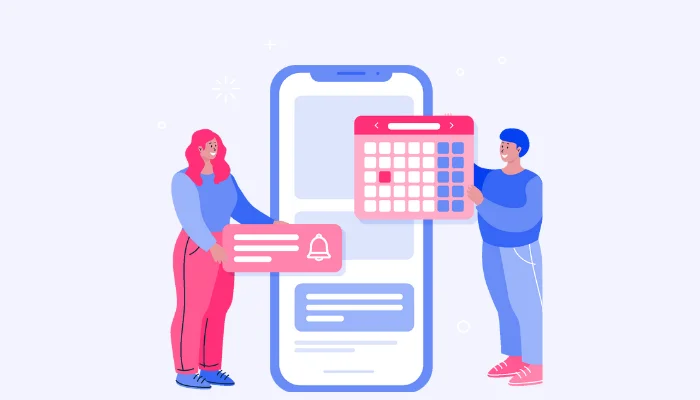
What is Event App
One of the first question people ask is, what exactly is event app?
Well, as the name suggests, an event app is a software application designed to enhance the overall experience of both event organizers and attendees.
Moreover, it serves as a digital platform for planning, managing, and attending events of all kinds, from conferences and trade shows to weddings and music festivals.
Event App Development can divide into several different types, but it’s a little more complex than it looks. Let’s discuss it in the section below.
Types of Event Apps
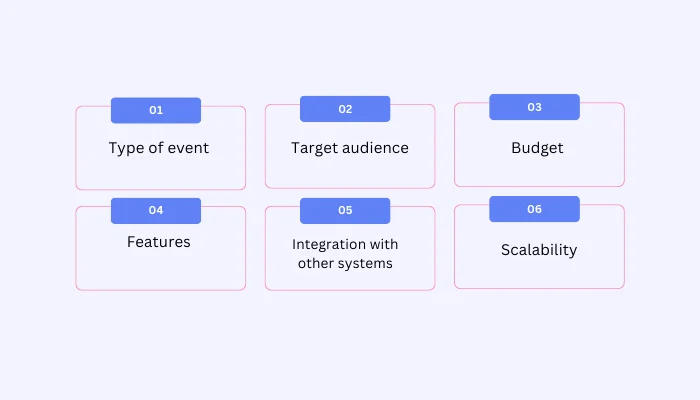
Types of Event Apps
Event management app is like a sky which holds endless starts which we can see as it’s types. Though in the particular sense they may not be endless, there are quite a few types.
So, what are these? Well, we can’t mention them in the traditional sense or shall we say they don’t exist in traditional sense of app types that you are used to seeing.
Rather each event business and event organizer has their own unique needs. This leads to endless forms of event management apps.
Therefore, there are few major factors which help businesses choose the right one or in better choice of words, build an event app that fits their needs.
- Type of event
- Target audience
- Budget
- Features
- Integration with other systems
- Scalability
To get the best possible solution, we highly recommend that you consult app development companies, as they can give you better walk around of the solution.
With this out of the way, let’s look at features before you create event app of your own.
How Does Event App Work? Features & Functionality
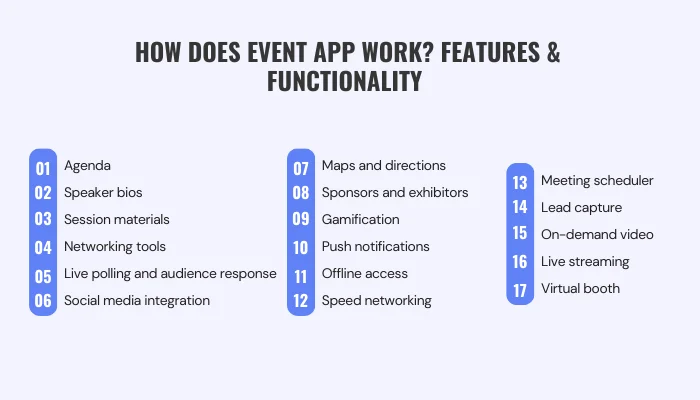
How Does Event App Work_ Features & Functionality
If you want to build your own event app, features are essential. Therefore, here are some essential features that you should consider.
These are, as mentioned below:
- Agenda
- Speaker bios
- Session materials
- Networking tools
- Live polling and audience response
- Social media integration
- Maps and directions
- Sponsors and exhibitors
- Gamification
- Push notifications
- Offline access
- Speed networking
- Meeting scheduler
- Lead capture
- On-demand video
- Live streaming
- Virtual booths
These are some of the major features to consider when you create event app. And with this out of the way, let’s look at benefits of event apps for organizers and event companies.
Why Organizers Should Build An Event App?
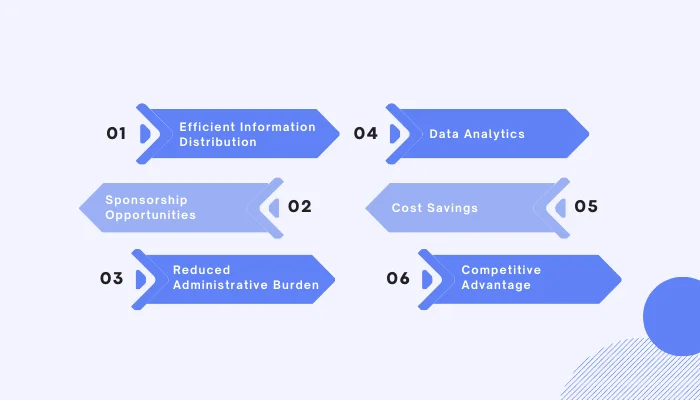
Why Organizers Should Build An Event App
So, it’s time to see, why should organizers or event companies create an event app of their own. And there are a range of reasons to consider it.
Let’s look at a few of these. They are, as mentioned below:
Efficient Information Distribution
Let’s start with the very first reason to build event app! Effective distribution of information.
You see, with an event management app, you can provide all essential event information in one place.
This will cover event schedules, speaker bios, maps, FAQs, and even exhibitor details.
Moreover, the attendees can easily access this information on their smartphones, eliminating the need for printed materials and reducing paper waste.
Sponsorship Opportunities
You see, the event management application will also offer innovative ways to incorporate sponsors and exhibitors.
Moreover, as an event organizer you can include sponsored content, banners, and interactive elements. This increase sponsor visibility and engagement.
This can be an additional source of revenue for your event.
Reduced Administrative Burden
This is yet another major reasons to create event app.
What happens here is, event apps can automate various administrative tasks. Including registration, ticketing, and check-ins.
Consequently, this reduces the workload on your team and minimizes the chances of errors.
Data Analytics
An event app provides valuable data on attendee behavior and preferences.
You can track which sessions were the most popular, which exhibitors attracted the most attention, and more.
This data can inform your decisions for future events and help you better understand your audience.
Cost Savings
Who doesn’t want to save some money? well, event organizer sure do!
While there is an initial investment in developing an event app, it can lead to significant cost savings in the long run.
Printing and distributing materials, such as brochures and schedules, can be expensive. An event app eliminates these costs.
Competitive Advantage
Offering an event app sets your event apart from others and positions it as modern and forward-thinking.
Therefore, the attendees often expect such conveniences, and not having one could put your event at a disadvantage.
These are reasons to create build an event app for organizers. And with this out of the way, let’s look at how virtual event applications are beneficial for the attendees.
Benefits of Event App For Attendees
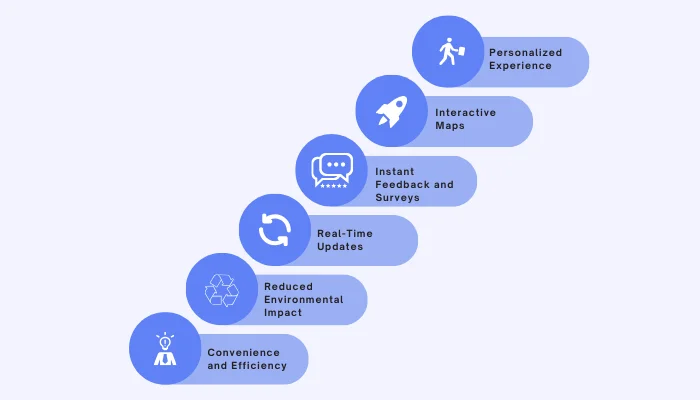
Benefits of Event App For Attendees
One of the big reasons why ever organizers are want to contact event app creator and create their own solution is, people love this apps.
But why? Well, there are a range of reasons why event management mobile are so loved. Let’s look at few of these below.
Personalized Experience
Event apps often allow attendees to customize their schedules.
Moreover, you can pick the sessions and activities that interest you the most and create a personalized agenda.
In addition, this means you won’t miss out on the events that matter to you.
Interactive Maps
Getting lost in a massive conference venue or festival ground can be frustrating. Event apps often include interactive maps that guide you to your desired location.
Moreover, they can even help you locate food vendors, restrooms, and emergency exits.
Instant Feedback and Surveys
Your opinion matters!
Event organizers often use apps to collect feedback through surveys and polls. Therefore, this allows you to share your thoughts about sessions, speakers, and the overall event experience,
Thus, helping organizers improve future events.
Real-Time Updates
Events can be unpredictable, and schedules may change.
With an event app, you receive real-time updates and notifications about any changes, Therefore, ensuring you’re always in the know.
No more wandering around wondering where that canceled session went!
Reduced Environmental Impact
With event apps, you can say goodbye to printed materials like brochures and schedules.
And contributing to a more sustainable and eco-friendly event. Moreover, it’s a small but meaningful step toward reducing paper waste.
Convenience and Efficiency
Ultimately, event apps make attending events more convenient and efficient. You don’t have to carry around a stack of papers or spend time searching for information.
Everything you need is conveniently stored on your smartphone.
With this cleared, it’s time to develop event app in few easy steps in next section.
Steps To Create Event App
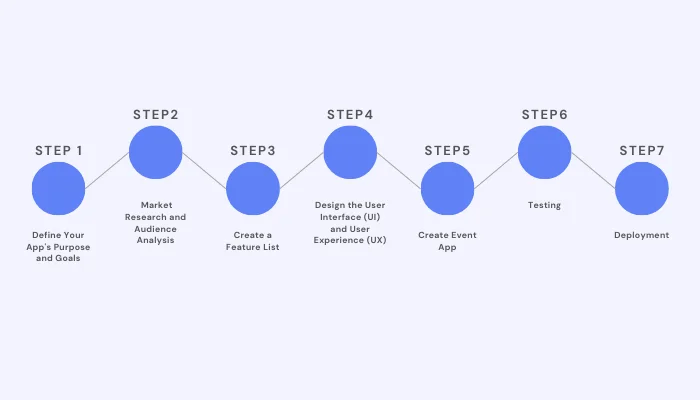
Steps To Create Event App
Let’s look at the mobile app development process to build an event app.
There are few easy steps that you need to follow. These are, as mentioned below:
Step 1: Define Your App’s Purpose and Goals
Before you dive build a virtual event app, you need a clear understanding of why you’re creating the event app.
Is it for conferences, music festivals, weddings, or something else? What are your goals? Do you want to enhance attendee engagement or streamline event management?
Clarifying these objectives will guide your development process.
Step 2: Market Research and Audience Analysis
Next, you should conduct thorough market research and analyze your target audience.
What do attendees expect from your app? What features are essential? What’s the competition like?
This information will help you tailor your app to meet the specific needs and preferences of your users.
Step 3: Create a Feature List
Based on your research, compile a list of features your event app should have.
This could include event schedules, maps, ticketing, networking tools, in-app messaging, and more.
Furthermore, it’s highly recommended that you prioritize these features to ensure your app addresses the most critical requirements.
Step 4: Design the User Interface (UI) and User Experience (UX)
UI/UX Design is crucial.
Your app needs to look good and be easy to use. Work with a talented designer to create a user-friendly interface.
Moreover, you should consider the app’s flow, color scheme, and branding. You want users to feel comfortable and excited when they open your app.
Step 5: Create Event App
Now comes the technical part. Hire app developers or a development team to bring your design and features to life.
You’ll need to choose the right platform (iOS, Android, or both) and the programming languages and tools that suit your project.
Step 6: Testing
Don’t skip this step!
Rigorous testing is vital to identify and fix any bugs or issues.
Therefore, you have to test the app on various devices and gather feedback from a group of beta testers.
Plus, it’s probably a good idea to address any problems promptly to ensure a smooth user experience.
Step 7: Deployment
Once your app is polished and bug-free, it’s time to release it to the world.
Submit your app to the App Store and/or Google Play Store, following their guidelines and requirements.
Moving on, with the process to create event app out of the way, it’s time to look at the cost.
How Much Does It Cost To Create Event App
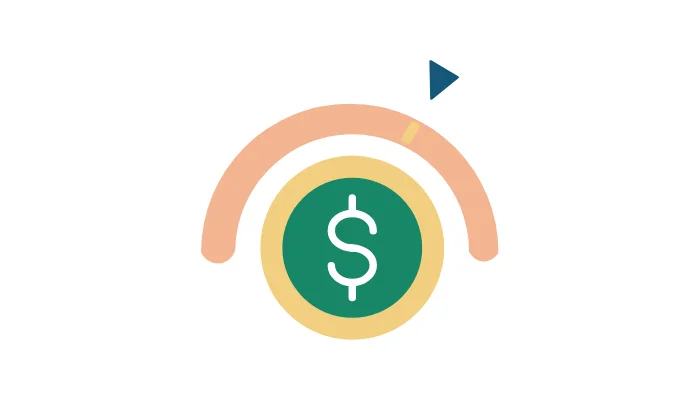
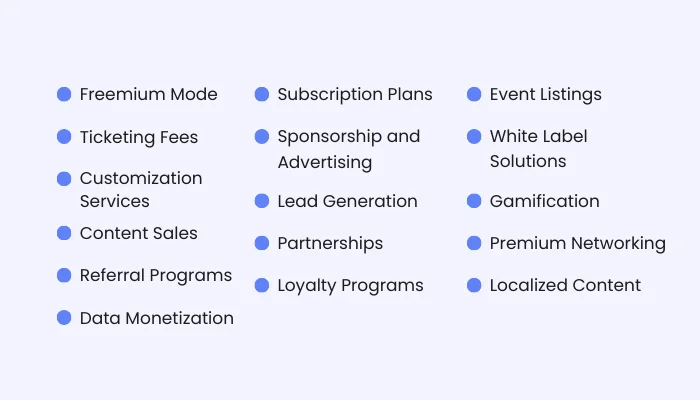
How Much Does It Cost To Create Event App
The cost to create event app can vary widely depending on factors like features, complexity, and development approach.
It can range from $2,000 to $65,000 depends on it’s specification. Consider your budget and priorities when planning your app.
And if you are looking for a closer cost estimation, we highly recommend that you consult an app development company who will help you with the same.
Timeline To Build An Event App
The timeline to build an event app can also vary based on its complexity.
A simple app may take a few months to develop, while a more advanced app could take six months or longer.
Therefore, before you create event app, sit down with the development team and plan your app development timeline well in advance of your event date.
Monetization Strategies For Event Apps
Lastly, how can you make money with your event management application? Well, it is simple enough. And we shall be looking right at it, in this section.
Some of the popular monetization strategies for event management application are, as mentioned below:
- Freemium Model
- Subscription Plans
- Event Listings
- Ticketing Fees
- Sponsorship and Advertising
- White Label Solutions
- Customization Services
- Lead Generation
- Gamificatio
- Content Sales
- Partnerships
- Premium Networking
- Referral Programs
- Loyalty Programs
- Localized Content
- Data Monetization
These are some of the top monetization strategies. And with this out of the way, let’s conclude the blog.
Conclusion
You can create an event app and significantly enhance both the organizers’ and attendees’ experiences. With various types and features tailored to specific needs, event apps offer efficiency, engagement, and revenue opportunities. While costs and timelines may vary, the benefits make them a valuable asset for modern event management, setting events apart in the competitive landscape.
FAQs
An event app serves as a digital platform to enhance event experiences. It offers attendees easy access to event information, networking opportunities, and real-time updates while helping organizers streamline operations.
Event apps come in various forms, including conference apps for corporate events, event management apps for organizers, social event apps for personal gatherings, and festival apps for large-scale public events.
Organizers benefit from event apps by improving attendee experiences, streamlining operations, gaining data insights for future events, and generating revenue through sponsorships and advertising.
Event apps enhance attendee experiences by providing convenience through centralized information, real-time updates, personalization options, and opportunities for networking and engagement.
The key steps include defining objectives and audience, choosing a development approach, designing the user interface, development, testing, launching, gathering feedback, and ongoing updates and maintenance.
The cost varies widely based on features and complexity, ranging from a few thousand dollars for basic apps to tens of thousands or more for feature-rich ones. Budget and priorities dictate the final cost.
The timeline varies depending on complexity. Simple apps may take a few months, while more advanced ones could take six months or longer. Planning well ahead of the event date is crucial.
Monetization options include ticket sales, sponsorships, in-app advertising, premium features, and selling anonymized event data and analytics to interested parties.
Yes, event apps can benefit a wide range of events, from corporate conferences and weddings to music festivals and trade shows. They are adaptable to diverse event needs.
While not mandatory, event apps have become a valuable tool for organizers to stay competitive, improve attendee experiences, and efficiently manage events. They offer a strategic advantage in today’s digital age.

Niketan Sharma is the CTO of Nimble AppGenie, a prominent website and mobile app development company in the USA that is delivering excellence with a commitment to boosting business growth & maximizing customer satisfaction. He is a highly motivated individual who helps SMEs and startups grow in this dynamic market with the latest technology and innovation.
Table of Contents










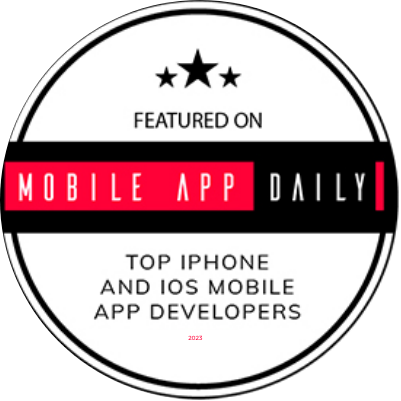
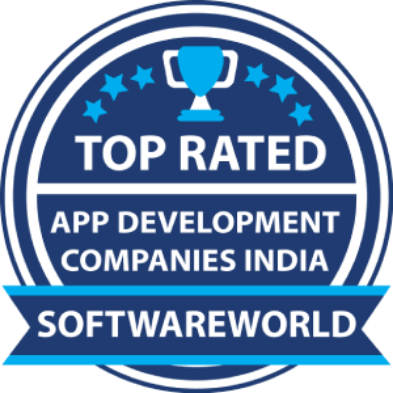
No Comments
Comments are closed.